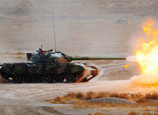
JERUSALEM, May 26 (Xinhua) -- Amid mounting tensions with Syria, Israel's military and rescue forces on Sunday launched a nationwide drill aimed at testing their readiness to cope with an unconventional weapons attack on the home front.
The four-day exercise, named "Steadfast Home Front 1," simulates hundreds of missiles -- some armed with chemical warheads and fired from neighboring foes Syria, Lebanon, Gaza and possibly Iran -- striking the greater Tel Aviv area and major cities across the country.
The Israeli Defense Forces (IDF) Home Front Command, the Home Front Defense Ministry and the Defense Ministry's National Emergency Authority are overseeing the event, the seventh held since the 2006 Lebanon War, when an estimated 4,000 rockets were lobbed at northern Israel.
Government offices and local authorities, in conjunction with first-responders -- including police, firefighters and paramedics - - are leading the exercise, which also aims to test the civilian population's response to mainly unconventional missile strikes.
As part of the simulation, two air-raid sirens will sound across the country on Monday, alerting civilians to seek refuge in protected areas wherever possible.
The IDF was careful to emphasize that this week's drill, which commenced Sunday at southern farming communities bordering Egypt, is not related to heightened tensions with Syria.
"This exercise is mostly intended to reach out to the civilian population, to make sure that they are aware of the threats around us, to know what they need to do in case of emergencies," Lt. Col. Peter Lerner, a military spokesman, told reporters in a conference call on Saturday night.
"The scenarios being drilled were planned a year in advance, well before the current tensions," he added.
Seeking to downplay fears of a nearing chemical attack, Home Front Defense Minister Gilad Erdan said over the weekend that Israel is not headed toward a war with Syria, and that the main threat remains a conventional missile attack.
"The scenario in which Syria uses chemical weapons against Israel is more likely than in the past, but is defined in low probability," Erdan told Channel 2 TV on Saturday. "Our enemies know that the use of unconventional weaponry will entail a very harsh and destructive response.
Last week, Erdan told a news conference that missile strikes on Israel's major cities are a matter of time. "The question is no longer if. The question now is when will they fire on population centers? It can happen tonight, or next week."
















 Couple say 'I do' after 35-year wait
Couple say 'I do' after 35-year wait


![]()
